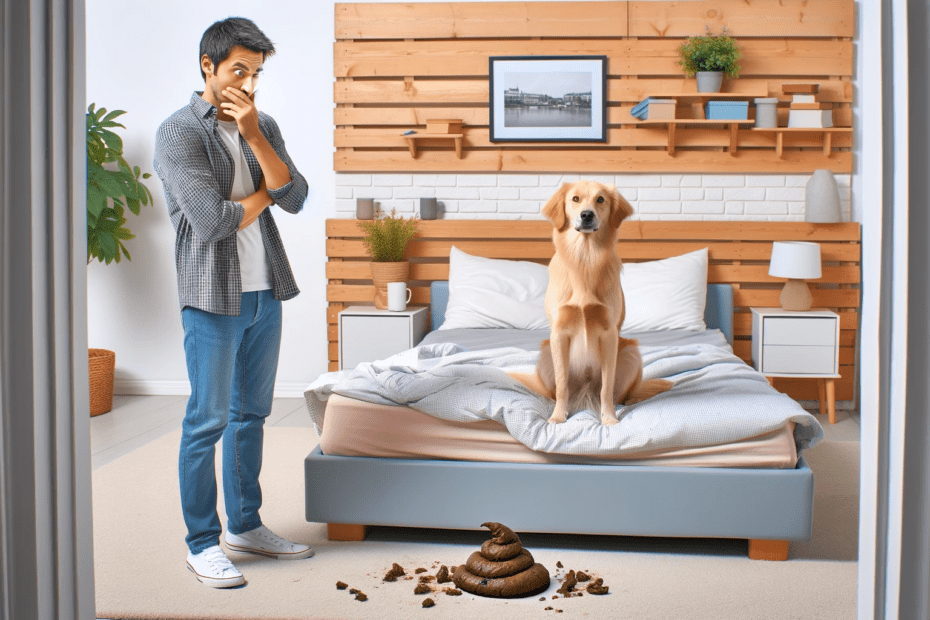In this research-based article, we delve into the perplexing behavior of dogs pooping on their owners’ beds.
Through a scientific lens, we explore various factors that may contribute to this undesirable habit, such as medical issues, stress triggers, behavioral problems, and territorial marking.
Drawing upon extensive research, we also provide insights on housetraining techniques, managing changes in routine or environment, and addressing separation anxiety.
By understanding the underlying causes, dog owners can take informed steps to prevent bed pooping in the future.
Key Takeaways
- Gastrointestinal distress or medical issues can cause dogs to poop on their owner’s bed, so consulting a veterinarian is important to address any underlying conditions.
- Stress and anxiety triggers, such as changes in routine or new additions to the household, can contribute to dogs pooping on the bed. Understanding and addressing these stressors can help prevent this behavior.
- Environmental factors like loud noises or unfamiliar surroundings can induce anxiety in dogs and lead to bed pooping. Providing a safe and consistent environment, along with behavior modification techniques, can reduce anxiety.
- Behavioral problems and training needs can also contribute to dogs pooping on the bed. Lack of proper obedience training, separation anxiety, or changes in the household dynamic should be addressed to discourage this behavior.
Medical Issues That Cause Bed Pooping
Medical issues can lead to dogs pooping on their owner’s bed. Dogs are generally clean animals and prefer to eliminate waste in appropriate areas. However, certain underlying conditions can disrupt their normal bathroom habits, causing them to defecate in unusual places, such as the owner’s bed.
One common medical issue that can lead to this behavior is gastrointestinal distress. Dogs suffering from conditions like inflammatory bowel disease or gastrointestinal infections may experience diarrhea or urgency to defecate. In some cases, they may not be able to control their bowel movements, resulting in accidents on the bed.
Additionally, certain medications or medical treatments can also contribute to this behavior. For instance, dogs undergoing chemotherapy or taking medications that affect the gastrointestinal system may experience side effects such as diarrhea or increased frequency of bowel movements. This can make it difficult for them to hold their bowel movements until they reach an appropriate elimination area.
It is crucial to consult a veterinarian if a dog consistently poops on the bed, as it may indicate an underlying medical condition. Diagnostic tests, such as blood work and fecal examinations, can help identify any medical issues. Once the underlying condition is diagnosed, appropriate medical treatment can be initiated to address the issue and prevent further accidents on the bed.
Stress and Anxiety Triggers
Stress and anxiety can be significant triggers for dogs to poop on their owner’s bed.
Environmental factors such as changes in routine, new additions to the household, or loud noises can contribute to a dog’s anxiety levels.
Additionally, certain behavioral triggers like separation anxiety or fear can also lead to this undesirable behavior.
Understanding and addressing these stressors can help prevent dogs from pooping on the bed.
Environmental Factors and Anxiety
One possible factor contributing to a dog pooping on their owner’s bed is the presence of environmental triggers that induce anxiety.
Environmental factors, such as loud noises, unfamiliar surroundings, or changes in routine, can create stress and anxiety in dogs. Research has shown that dogs are highly sensitive to their environment, and certain stimuli can elicit fear and anxiety responses.
Dogs may resort to pooping on their owner’s bed as a coping strategy to alleviate their anxiety. Coping strategies, such as seeking comfort in familiar environments or marking territory, can help dogs feel more secure in stressful situations.
Providing a safe and consistent environment for dogs, along with positive reinforcement training and behavior modification techniques, can help reduce anxiety and prevent inappropriate elimination behaviors like pooping on the bed.
Behavioral Triggers and Stress
Behavioral triggers and stress can significantly contribute to a dog pooping on their owner’s bed. Dogs, like humans, experience stress and anxiety, and they may exhibit certain behaviors as a result. Coping mechanisms for dogs with stress can help alleviate their anxiety and reduce the likelihood of inappropriate elimination, such as pooping on the bed.
One effective strategy for reducing anxiety in dogs is providing them with a safe and comfortable space where they can retreat when feeling overwhelmed. This can be a designated area in the home with their bed, toys, and familiar scents.
Additionally, engaging in regular exercise and mental stimulation can help reduce stress levels in dogs. Positive reinforcement training and the use of calming aids, such as pheromone diffusers or anxiety wraps, can also be beneficial in managing stress and anxiety in dogs.
Behavioral Problems and Training Needs
To address the issue of dogs pooping on beds, it is important to understand that this behavior can often be attributed to underlying behavioral problems and training needs.
Dogs are naturally inclined to seek out a specific spot to relieve themselves. However, when they choose to do so on the bed, it suggests a deviation from normal dog behavior.
One possible explanation for this behavior is a lack of proper dog obedience training. Dogs require consistent training to learn appropriate behaviors and boundaries. Positive reinforcement training is an effective method to encourage desired behaviors while discouraging unwanted ones. This training approach involves rewarding the dog for good behavior, such as using a designated bathroom area, and ignoring or redirecting the dog when it exhibits undesirable behavior, such as pooping on the bed.
Behavioral problems can also contribute to dogs pooping on beds. Anxiety, fear, or stress can disrupt a dog’s normal elimination routine and lead to accidents in inappropriate places. Identifying and addressing the underlying cause of these behavioral problems, whether it’s separation anxiety or a change in the household dynamic, is crucial in resolving the issue.
Marking Territory – A Possible Explanation
A possible explanation for dogs pooping on beds is their instinctual behavior of marking territory. Territorial marking is a natural behavior exhibited by many animals, including dogs. It serves as a means of scent communication, allowing them to establish and maintain their territory. By leaving their scent on objects such as beds, dogs are able to communicate their presence to other animals and assert their ownership over that particular area.
Scent communication plays a crucial role in the social interactions of dogs. Through the release of specific chemicals in their feces, dogs leave behind a unique scent that contains information about their identity, gender, and reproductive status. This scent acts as a form of communication, conveying important messages to other dogs in the vicinity.
While dogs typically engage in territorial marking outdoors, certain factors may lead them to mark their territory indoors, including anxiety, stress, or the presence of unfamiliar scents. Marking territory on beds, in particular, may be a way for dogs to claim their space within the household and assert their dominance.
Understanding the instinctual behavior of marking territory can help dog owners address this issue. Providing ample opportunities for dogs to engage in appropriate marking behavior outdoors, along with proper training and management techniques, can help discourage them from marking their territory on beds and other inappropriate areas.
Lack of Proper Housetraining
Lack of proper housetraining can be a significant reason why a dog may poop on the bed. Inconsistent bathroom training methods and the absence of a designated area for elimination can result in confusion and accidents.
Research suggests that establishing a consistent housetraining routine and providing clear cues for desired elimination locations can effectively address this issue.
Inconsistent Bathroom Training Methods
Inadequate and inconsistent bathroom training methods contribute to dogs pooping on the bed. Different types of dog training methods can be employed to establish a consistent bathroom routine.
One effective approach is crate training, where dogs are confined to a crate when unsupervised. This teaches them to hold their bladder and bowels until they are taken outside.
Another method is the use of positive reinforcement, rewarding the dog for eliminating in the designated outdoor area. Consistency is key in housetraining, maintaining a regular schedule for feeding and bathroom breaks.
Supervision is crucial during the training process to prevent accidents and redirect the dog to the appropriate area. Providing ample opportunities for the dog to relieve themselves outside and promptly cleaning any accidents indoors is essential.
Lack of Designated Area
One of the factors contributing to dogs pooping on the bed is the absence of a designated area for proper housetraining. Dogs need a clear understanding of where they are allowed to relieve themselves. Without a designated area, they may become confused and choose inappropriate locations, such as the bed.
To address this issue, pet owners should establish a specific spot where their dog can eliminate, such as a grassy area in the backyard or a designated indoor potty spot. Housetraining should involve consistent reinforcement and positive reinforcement techniques to encourage the desired behavior.
Changes in Routine or Environment
Due to alterations in their daily routine or environment, dogs may occasionally defecate on their owner’s bed. Changes in routine, such as a new work schedule or a family member leaving for college, can disrupt a dog’s established bathroom habits and lead to accidents. Additionally, dogs are creatures of habit and thrive on consistency. Any significant change in their environment, such as moving to a new house or rearranging furniture, can cause stress and anxiety, which may manifest in inappropriate elimination.
One common reason behind this behavior is separation anxiety. Dogs are social animals that form strong bonds with their owners. When left alone for extended periods, they may experience distress and anxiety. This emotional turmoil can result in behavioral issues, such as defecating in inappropriate places like the bed. It is important to note that dogs with separation anxiety may also exhibit other signs, such as destructive behavior, excessive barking, or pacing.
To address this issue, it is crucial to provide dogs with a stable routine and environment. Maintaining a consistent schedule for feeding, exercise, and bathroom breaks can help regulate their bowel movements. Additionally, gradually introducing changes and providing ample mental and physical stimulation can help alleviate anxiety associated with alterations in the environment.
Separation Anxiety and Bed Pooping
Separation anxiety can be a significant factor contributing to a dog’s tendency to defecate on their owner’s bed. Dogs with separation anxiety experience intense distress when separated from their owner or when left alone. This anxiety can manifest in various ways, including destructive behavior, excessive barking, and, in some cases, eliminating on the owner’s bed.
One reason why dogs with separation anxiety may choose to defecate on their owner’s bed is due to the familiar scent. The bed carries the owner’s scent, providing a source of comfort and security for the anxious dog. By defecating on the bed, the dog is essentially marking their territory and seeking reassurance.
Another reason for this behavior is the disruption of the dog’s bedtime routine. Dogs are creatures of habit, and any changes to their routine can cause stress and anxiety. When the owner leaves the house, it disrupts the dog’s usual routine, leading to anxiety and possibly resulting in inappropriate elimination.
Crate training can be an effective method to help alleviate separation anxiety and prevent bed pooping. By providing a safe and secure space for the dog, a crate can help reduce anxiety and provide a sense of comfort. Gradual desensitization and positive reinforcement techniques can be used to help the dog associate the crate with positive experiences and reduce anxiety when left alone.
How to Prevent Bed Pooping in the Future
To prevent bed pooping in the future, pet owners can take proactive measures to establish a consistent and structured routine for their dogs. Preventing accidents requires a combination of proper training, behavioral management, and understanding the benefits of crate training.
Firstly, establishing a consistent routine is essential in preventing accidents. Dogs thrive on routine and predictability, so providing them with a structured schedule for feeding, exercise, and bathroom breaks can help regulate their bowel movements. Regular walks and playtime can also help stimulate their digestive system and encourage them to relieve themselves outside.
Secondly, crate training can be highly beneficial in preventing bed pooping. Dogs naturally avoid soiling their sleeping areas, so crate training can teach them to hold their bladder and bowels until they are let outside. A crate provides a safe and comfortable space for the dog, helping them establish a den-like environment where they can rest without the risk of accidents.
Furthermore, crate training can aid in house training by limiting the dog’s access to the rest of the house when unsupervised. This helps prevent accidents on the bed or other furniture while the owner is away. Gradually increasing the time spent in the crate and rewarding the dog for good behavior can make crate training a positive and effective method for preventing bed pooping.
Frequently Asked Questions
Can a Dog’s Diet Contribute to Bed Pooping?
A dog’s diet can indeed contribute to their bathroom habits, including pooping on the bed. Food allergies in dogs can lead to digestive issues, causing irregular bowel movements.
Additionally, stress can have a significant impact on a dog’s bathroom habits. Stress can disrupt their digestion and lead to anxiety-related behaviors, such as pooping in inappropriate places.
Therefore, it is essential to carefully monitor and manage a dog’s diet and address any potential stressors to prevent this behavior.
Can Medications or Treatments Help Prevent Bed Pooping in Dogs?
Medications and alternative treatments can be effective in preventing bed pooping in dogs.
Various medications, such as anti-anxiety drugs or anti-diarrheal medications, may be prescribed by a veterinarian to address underlying issues that contribute to this behavior.
Additionally, alternative treatments such as behavioral modification techniques or dietary changes can also help prevent bed pooping.
However, it is important to consult with a veterinarian to determine the most appropriate and effective course of action for each individual dog.
Are There Any Specific Dog Breeds That Are More Prone to Bed Pooping?
Certain dog breeds may be more prone to bed pooping than others. However, it is important to note that bed pooping can occur in any breed and is not exclusive to specific breeds.
Several factors contribute to this behavior, including the dog’s age, health conditions, and training history.
Further research is needed to determine if certain breeds have a higher predisposition for bed pooping, as current studies have not identified any specific breed associations with this behavior.
Can a Dog’s Age or Health Condition Be a Factor in Bed Pooping?
The age and health condition of a dog can indeed be factors in bed pooping behavior.
As dogs age, they may experience changes in their digestion and bowel movements, leading to accidents on the bed.
Additionally, certain health conditions, such as gastrointestinal issues or urinary tract infections, can cause dogs to have difficulty controlling their bathroom habits.
It is important to consult with a veterinarian to rule out any underlying health issues and to develop a plan for managing the dog’s bathroom habits.
Is There a Certain Time of Day When Bed Pooping Is More Likely to Occur?
When examining the behavior patterns of dogs regarding the act of pooping on beds, it is important to consider if there is a certain time of day when this behavior is more likely to occur.
Research suggests that dogs do not have a specific time of day when bed pooping is more likely to happen. However, it is worth noting that dogs are creatures of habit and tend to follow routines.
Therefore, observing their daily patterns and habits may provide insights into this behavior.
Conclusion
In conclusion, there are several possible reasons why a dog may poop on their owner’s bed.
Medical issues, stress and anxiety triggers, behavioral problems, marking territory, lack of proper housetraining, changes in routine or environment, and separation anxiety can all contribute to this behavior.
It is important for dog owners to identify the underlying cause and address it through proper training, medical intervention, or environmental adjustments to prevent bed pooping in the future.






